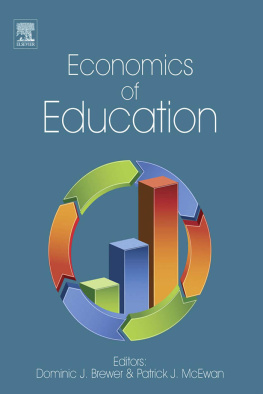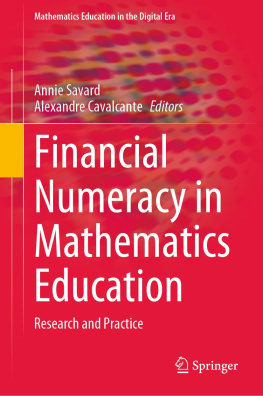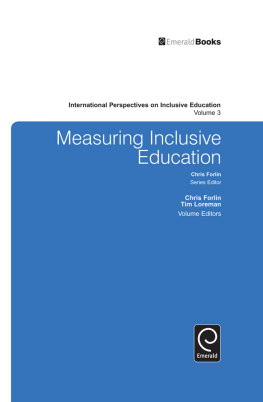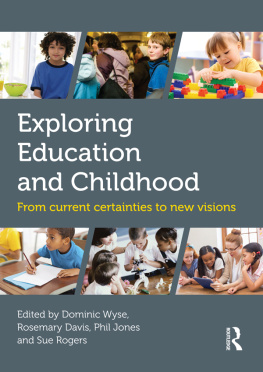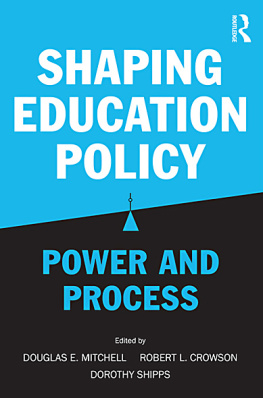ECONOMICS OF
EDUCATION
ECONOMICS OF
EDUCATION
EDITORS
DOMINIC J. BREWER
Associate Dean for Research and Faculty Affairs
Clifford H. and Betty C. Allen Professor in Urban Leadership
Professor of Education Economics and Policy
University of Southern California
Los Angeles, CA
USA
PATRICK J. McEWAN
Whitehead Associate Professor of Critical Thought
Associate Professor of Economics
Wellesley College, MA
USA

Academic Press is an imprint of Elsevier
Linacre House, Jordan Hill, Oxford, OX2 8DP, UK
525 B Street, Suite 1900, San Diego, CA 921014495, USA
Copyright 2010 Elsevier Ltd. All rights reserved
No part of this publication may be reproduced, stored in a retrieval system or transmitted in any form or by any means electronic, mechanical, photocopying, recording or otherwise without the prior written permission of the publisher
Permissions may be sought directly from Elseviers Science & Technology Rights Department in Oxford, UK: phone (+44) (0) 1865 843830; fax (+44) (0) 1865 853333; email: permissions@elsevier.com. Alternatively you can submit your request online by visiting the Elsevier web site at ( http://elsevier.com/locate/permission ), and selecting Obtaining permission to use Elsevier material
Notice
No responsibility is assumed by the publisher for any injury and/or damage to persons or property as a matter of products liability, negligence or otherwise, or from any use or operation of any methods, products, instructions or ideas contained in the material herein. Because of rapid advances in the medical sciences, in particular, independent verification of diagnoses and drug dosages should be made
British Library Cataloguing in Publication Data
A catalogue record for this book is available from the British Library
Library of Congress Cataloguing in Publication Data
A catalogue record for this book is available from the Library of Congress
ISBN: 978-0-08-096530-7
For information on all Elsevier publications
visit our website at
PRINTED AND BOUND IN SPAIN
08 09 10 11 10 9 8 7 6 5 4 3 2 1

PREFACE
Economists study how firms, consumers, and governments allocate scarce resourceswhether money or timeto their competing ends. Economists of education focus their attention on resource allocation among schools, families, students, and the governments that frequently dominate the education enterprise. Despite references in classic works by Adam Smith and Alfred Marshall, it is fair to say that most economists remained unconvinced, well into the 20th century, that they should be studying education.
This changed dramatically in the 1950s and 1960s as human capital theorists like Jacob Mincer, Theodore Schultz, and Gary Becker convinced academics and the general public that individuals make decisions about schooling in much the same way that firms make decisions about physical capital: as costly upfront investments in productivity-enhancing human capital that yield a future stream of benefits to individuals and, perhaps, to societies at large. Hundreds of empirical studies, in developed and developing countries, sought to estimate the pecuniary returns to such investments, typically termed rate of return (ROR) studies. Towards the end of the 1960s, spurred by the work of James Coleman in the United States, economists began peering into schooling firms. Using education production functions, they empirically analyzed the links between schooling inputs and outputs, and waded into policy debates over American schooling. Even today, these Education Production Function (EPF) studies are a principal endeavor of economists of education.
The quantity and quality of research on the economics of education has expanded tremendously in the last 20 years. This growing research basereflected in the 50 chapters that followhas three features. First, it uses new and richer sources of education data and sophisticated empirical research designs to conduct more credible ROR studies, as well as delve more deeply into the causal link between education inputs and student outcomes. Second, it has expanded the range of acceptable topics well beyond private ROR and EPF studies. Economists have now analyzed the social and non-market returns to education; the effects of a multitude of school, classroom, neighborhood, and family influences on student success; neglected topics such as teacher labor markets; and market- and incentive-based policies for school improvement such as private school vouchers and accountability. Third, newer research has a distinctive emphasis on improving education policy and schools, and economists of education are increasingly engaged in policy design, evaluation, and advocacy, in the United States and abroad.
Section 1: Overview
The first three chapters provide a broad overview of theory and empirics in the economics of education. Brewer, Hentschke, and Eide review the fields theoretical concepts, including the shared assumptions and models of microeconomists who study education. Given the increasingly applied and empirical nature of the field, McEwan discusses empirical research methods, including the emerging emphasis on experimental and quasi-experimental research designs with a strong causal validity. Perez and Socias provide an overview of data in the economics of education that have catalyzed applied research. The remaining articles can be roughly arranged into four groups (with chapter-specific cross-references providing additional guideposts).
Section 2: The Private and Social Returns to Human Capital Investments
The backbone of the economics of education is still human capital theory (Eide and Showalter) and seminal critiques such as signaling theory (Page). These theories have inspired many studies of the economic return to schooling, both in developed countries (Gunderson and Oreopoulos) and developing ones (Patrinos and Psacharopoulos). In recent years, economists have examined economic returns not just to years of schooling, but also to the measured quality of schooling (Betts). A related macroeconomic literature, often using cross-country data, has examined educations links to aggregate economic outcomes (Hanushek and Wmann). Beyond earnings, economists increasingly examine the effects of schooling on a wide range of non-market and social outcomes. One chapter reviews the broad literature on the externalities of education (McMahon). Others focus on specific non-market or social returns to schooling including health (Muennig), crime (Lochner), and civic engagement (Dee).
Throughout its history, the field has shown special interest in the unequal distribution of schooling inputs and outputs. One chapter broadly reviews the literature on education and inequality (Blanden and Machin). Another focuses on the specific case of racial earnings differences in the United States and abroad (Carnoy). An additional chapter examines the special case of high school dropouts in the United States (Rumberger).
Section 3: The Production, Costs and Financing of Schooling
The voluminous literature on education production functions is summarized in detail. Three chapters provide overviews of its conceptual and empirical underpinnings (Harris), the accumulated evidence base in developed countries (Hanushek), and the equally large body of empirical studies in developing countries (Glewwe and Lambert). Among EPF studies, there are now excellent sub-literatures on specific school and family inputs. These include family environments and socioeconomic status (Rothstein; Currie and Goodman); composition of peer groups and neighborhoods (Vigdor and Ludwig; Rivkin); teachers and teacher quality (Pelayo and Brewer); class sizes (Schanzenbach); and early childhood interventions (Nores).
Next page
